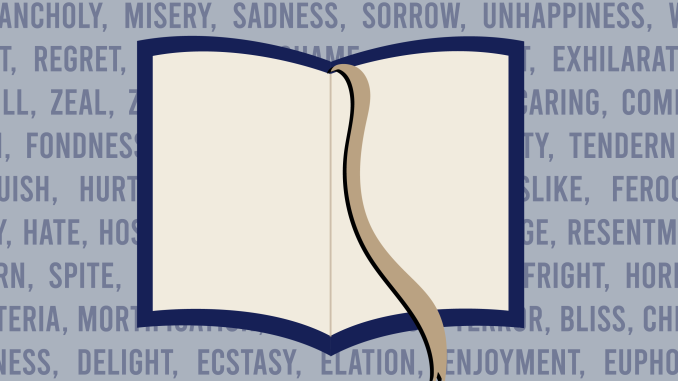
“It’s not about curing anxiety, it’s about building a toolbox of strategies to help combat it,” my school counselor told me after I had a panic attack in class when I was about 12, landing me in her office.
She opened the closet behind her desk, and grabbed a glossy composition notebook with orange spirals on the cover, a matching sparkly orange pencil and a dollar-store lavender-scented hand sanitizer, which I assumed was an attempt at aromatherapy. I appreciated the effort.
My counselor told me I should start journaling to cope with my emotions because they’re better out than bottled up. She explained to me that my journal was private and that I didn’t need to share it with anyone if I didn’t want to.
I left that day with one of the most important tools in my toolbox, an empty notebook.
From a young age, I could see my future in front of me, but I feared that glistening image of success and happiness would collapse out from under me if I wasn’t perfect. This isn’t a feeling you would expect many children to have, but growing up around my older cousins — who were naturally good at everything — made me second guess myself often.
During panic attacks, my chest felt abnormally tight, and I would tell my mom, “I feel everything.” I later learned this whirlwind of feelings was generalized anxiety disorder.
I was constantly nervous I would mess up, get a bad grade or get in trouble, which in my mind, inevitably led to failure. Breathing exercises only made me focus on what worried me more. After taking three deep breaths, I still felt anxiety creeping through my body because I couldn’t relax.
Loneliness affected every aspect of my childhood. I feared my peers wouldn’t accept me because of my personality or my anxiety, so I isolated myself behind books and journals, thinking I couldn’t be judged if I wasn’t noticed. I had never been to therapy before because I was scared of being seen as fragile or incapable.
I remember thinking this feeling would go away when I get older, but it never did.
When I was around 13 years old, I came home from ballet rehearsal one night and picked around my food, occasionally taking a bite. My mind was too focused on the fact my friend wasn’t going to be on the bus the next day– she had a doctor’s appointment in the morning.
Who was I going to talk to? How was I going to walk to the bus alone? This small detail was going to disturb my routine, it was enough to make me nauseous and anxious.
I decided to open my new notebook. I wrote slowly, beginning with a summary of my day, and letting my feelings and worries come after. I began to feel more comfortable as I continued to write.
Once I finished, I felt the pressure leave my chest and my mind became less loud. Writing out my worries made them seem more manageable.
Journaling was something I continued through high school. Many days I felt burdened with my ‘to-do list,’ and if I missed anything, I thought I would be doomed to fail.
On days where my mind raced and I couldn’t bring myself to study or finish my homework, I still found time to write an entry.
I bought a new journal. It was an orange softcover with a surfer on the front. The passages focused on my anxiety about the future, my fear of not getting into my dream school, finding a date to prom and getting a high enough ACT score.
After a terrible date one week into the semester, I felt the urge to pick up my journal again. I closed my bedroom door, and that feeling of panic began to brew and tighten in my chest.
I lost my breath and choked on my feelings and words, unable to call or talk to anyone. I opened my journal, and I wrote, letting my emotions forcefully flow through my pen. The pain, the sadness and the hate melted away as I felt my return to balance and presentness.
Since then, I have filled many notebooks, with my fears, my successes, my sadness and my anxious feelings.
My journal entries are never scheduled or planned, and they don’t have to be. I don’t need a strict regimen to begin, and I don’t have to write about anything notable in particular. The idea is to make the process as organic as possible, simply letting my thoughts reflect onto the pages.
Writing has become a form of therapy for me, and lately, journaling has become more of a time capsule. I like writing happier and joyous entries because I’ve realized letting myself celebrate victories is important, too.
It is this duality — the pain and the joy — that makes re-reading my journals impactful. Seeing myself grow up through my entries demonstrates my ability to overcome a feeling I thought would never go away.
My journal now is a teal moleskin covered in stickers and photos. It may look a little different, but it has become a story of my life and struggles.
One day someone will read these entries, including the embarrassing ones about horrible first dates and breakups, and the ones about graduating, getting into college and making friends. They’ll learn that even when the mundane tasks generate anxiety, you can easily break down any situation and overcome stress and anxiety.
As Nov. 15 is National I Love to Write Day, I pick up my pen and write. Not only am I easing the tension I feel in my body from the weight of life on my shoulders, but I am expanding on my own legacy and claiming my story and journey as my own.



Be the first to comment